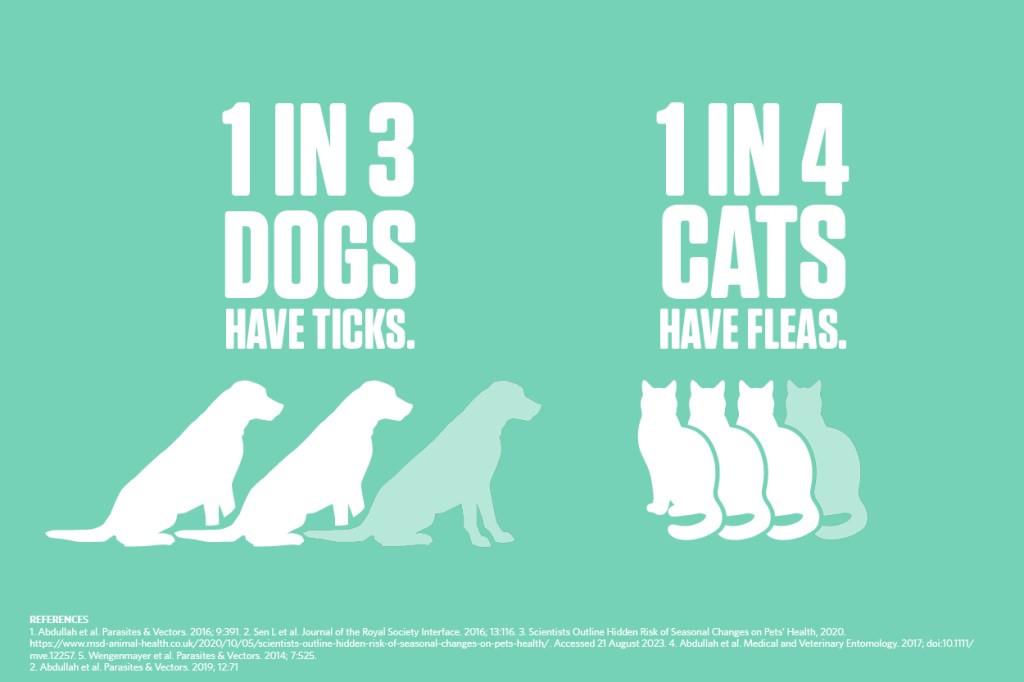What are fleas and ticks?
Fleas and ticks are small external parasites that feed on animal or human blood and may be commonly found on dogs and cats.
Why do I need to protect my puppy against fleas and ticks?
Fleas and tick bites can lead to irritation, pain and skin problems but they can also spread harmful diseases to you and your pet.
Flea bites can be incredibly itchy! Commonly pets develop allergy to flea saliva resulting in an intensely irritating skin condition called flea allergic dermatitis. If a puppy were to have a heavy infestation, they can develop serious anaemia; fleas can also spread diseases like tapeworm and cat scratch disease (bartonellosis) to you or your pet. It is unpleasant to be bitten by a tick, but whilst feeding, they can also spread harmful diseases to you or your pet. For example, babesiosis is a disease spread by ticks which affects your dog’s red blood cells and can make them very unwell. Lyme disease is a bacterial infection which causes a rash and flu-like symptoms in humans, but can progress to joint, heart and nervous system issues.

When should I protect my puppy?
Fleas and ticks were traditionally thought of as just a seasonal issue, but they can now be a risk all year round due to central heating, increasing outdoor temperatures, and increasing pet travel inside and outside of the UK. There are many options for flea and tick protection available from your vets, many of which are ok to start from 8 weeks of age. Always speak with your vets for advice on which product is best suited for your puppy, when and how to give it to them.
Are there different options for flea and tick treatment?
There are many options for flea and tick protection available from your veterinary practice, who will be the best source of advice on which product would be most suitable.
Flea and tick treatments for dogs have different active ingredients in them and come in many forms including chews, spot ons, or an injection. They also last for varying lengths of time such as 1 to 3 months or 12 months.
How does flea and tick protection change as my puppy grows?
As your puppy develops, their health needs, especially when it comes to parasite protection, can change. In the early months, puppies typically require monthly treatments to protect against fleas, ticks, and worms. But as they grow, longer-duration options may become more suitable, offering convenience without compromising protection.
Worming protocols can also shift over time. While frequent treatments are often needed during puppyhood, adult dogs may benefit from a more tailored, risk-based approach depending on their lifestyle, environment, and travel habits.
That’s why it’s important to speak with your vet regularly. They can help you choose the most appropriate parasite protection plan at every stage of your dog’s life—from playful pup to golden oldie.
Are flea and tick treatments safe for my puppy?
All pet prescription medicines including parasite treatments for fleas and ticks have to meet the strict safety, quality and efficacy requirements of the Veterinary Medicines Directorate (VMD) before they are approved for use in UK pets. Once approved, data is then constantly collected on use and any side effects experienced. It is important to follow the label instructions that come with medication – always speak to your veterinary surgeon for further advice on appropriate use of specific products.
What is the difference between flea and tick treatment from my vet vs the shop?
Flea and tick treatments vary widely in how they work, what parasites they protect against, how long they last, and how they’re administered. While shop-bought products may offer basic protection, they often differ in strength, spectrum, and duration compared to those available through your vet.
Some of the most advanced and long-lasting treatments, such as those offering up to 12 weeks or even 12 months of protection, are only available from a veterinary practice. These options may include unique active ingredients or formats that aren’t accessible in supermarkets or online retailers like Amazon.
When you get your pet’s parasite protection from your vet, you’re not just buying a product, you’re getting tailored advice. Your vet will assess your pet’s health, weight, lifestyle, and environment to recommend the most appropriate and effective treatment. They’ll also ensure correct dosing and provide guidance on safe use, including bathing, swimming, and disposal.
Every pet is different, and so is every household. That’s why a one-size-fits-all approach from the shelf can fall short. For peace of mind and the best protection, it’s always worth having that conversation with your vet.
Your vet plays a big role in your pet’s health. Enter your location and get a list of vets near you.
FIND A VET















 Go To United States
Go To United States Austria
Austria Belgium
Belgium Czech Republic
Czech Republic Denmark
Denmark Europe
Europe Finland
Finland France
France Germany
Germany Greece
Greece Hungary
Hungary Ireland
Ireland Israel
Israel Italy
Italy Netherlands
Netherlands Norway
Norway Philippines
Philippines Poland
Poland Portugal
Portugal Romania
Romania Saudi Arabia
Saudi Arabia Slovakia
Slovakia South Africa
South Africa Spain
Spain Sweden
Sweden Switzerland
Switzerland Turkey
Turkey United Kingdom
United Kingdom